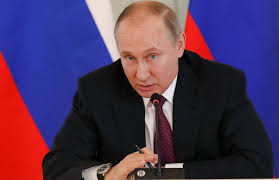ROME – Russian President Vladimir Putin believes it is too early to speak about what he will do after he completes his term in the office, he said in an interview with the Italian Corriere Della Sera newspaper published on Thursday ahead of his visit to Italy.
“It is too early to talk about it. Five more years of hard work are ahead,” he said. “And considering the whirlwind pace [of developments] that we are now witnessing in the world, it is hard to make predictions,” Putin added.
“Believe me, I have enough business to take care of in my current position,” the Russian leader pointed out.
Putin’s second running six-year presidential term expires in 2024. In accordance with the Russian Constitution, one person cannot serve as the President for more than two terms in a row.
Putin already held the highest office in the country for two straight then four-year terms in 2000-2008. He then served as the Russian Prime Minister for four years.
G20 summits may not produce groundbreaking results, but format remains vital, says Italian PM
On the other hand, summits of G20 leaders cannot always bring about groundbreaking results, but the forum provides a unique opportunity for holding important discussions, Italian Prime Minister Giuseppe Conte said in an exclusive interview with TASS First Deputy Director General Mikhail Gusman ahead of Russian President Vladimir Putin’s official visit to Italy on Thursday.
“G20 is an important format because it allows the leaders of top 20 biggest economies to discuss global challenges. In Japan, we touched upon the burning issue of climate change, problems of high-quality infrastructure facilities; together we contemplated how digital technologies are changing system links on the labor market. All those topics are of utmost importance,” the head of the Italian government believes.
“Naturally, one shouldn’t expect such discussions to bear great fruit, but the dialogue in itself and agreement on key issues are very important,” Conte pointed out.
The PM points out that G20 summits are meant to shape the most suitable policy, which “encourages something or, on the contrary, does not encourage something”, as well as to provide an idea of “how we can steer the future development for the benefit of our citizens, how our coordinates are changing.”
TASS
R.S

